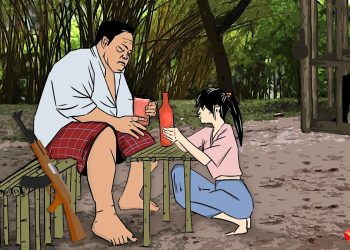PHARUSOE, Karenni State — After a bumpy eight-hour ride on a dirt road that snakes around a mountainside, a village shrouded by evening mist came into view.
Nestled in a valley about 20 miles south of Loikaw—the capital of Karenni State—Ra E Pra is a village of about 300 residents belonging to the Kayaw ethnic group, a sub-group of the Karen residing in Karenni state.
While the Padaung or Kayan women of Karenni State are famous for the metal rings they wear around their necks, Kayaw women elongate their earlobes with metal cylinders. Both men and women wear long necklaces adorned with colorful beads and silver coins and pendants.
Another main feature of the Kayaw women’s dress is wearing brass rings around their knees
and ankles. When someone dies, their rings and necklaces are buried along with them as “they are their belongings,” villagers explained to me.
A tour around the village reveals the way of life of the Kayaw, who are mostly Christian. They live in houses on stilts. They grow rice, millet and mustard and raise cattle. A primary school in the village has nearly 40 students. Poverty among the villagers is evident.
Although the tribe is known for its necklaces and the metal cylinders worn in the earlobes, most of the younger people no longer wear traditional jewelry. Older people explained that the younger generation sees the fashion as something embarrassing, especially when they go to cities in search of work.
“With those things, they said, they are afraid to be the center of attention, and they feel annoyed at being stared at in amazement. Only some older people wear them here today,” said Kyi Zar, 65, a village dignitary.
“But once a year, they all wear them on Karenni National Day because it’s customary,” he added.

















